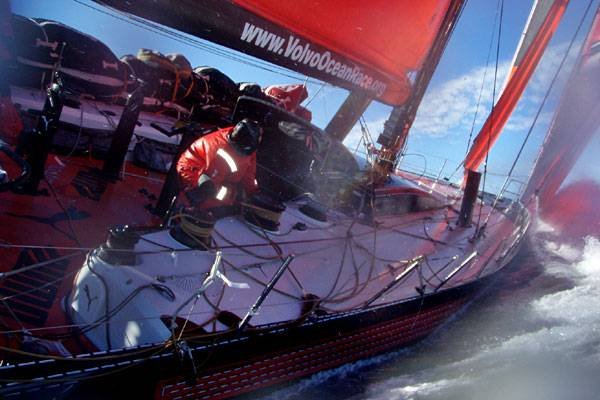
The Nordic crew on Ericsson 3 have taken the old expression ‘make hay while the sun shines’ to heart over the past day. The team is roaring up the South Atlantic, frantically adding miles to their lead in anticipation of a possible park-up before the finish line in Rio.
“There are still many things that can go wrong and the next thing to worry about is a high pressure that we will soon reach. And now it looks like it will be very light when we get closer to Rio, which also gives the others an opportunity to catch up.”
There are two high pressure systems which are forecast to block the road to Rio over the coming days. If the leading boats get caught in the sticky conditions it could result in a virtual re-start, just over two days from the finish line. Ericsson 3 is pouring on the pressure, making good 449 miles over the past 24 hours in a very difficult environment. So testing, in fact, that the crew was worried about damaging the boat in the punishing waves overnight. Again, from Gustav:
“If someone thought the tough days were over, they were wrong. Yesterday evening and the entire night has been a fight. Boat-breaking conditions for sure. Hard reaching with a really nasty sea state and never-ending slamming and bashing…
“Since the breakdown everyone is a bit worried when we hit bad conditions with a lot of slamming. Bu we all put a lot of trust in Jens, our boat-captain, and if he is happy we are usually happy… Jens looked calm almost all the time during the night and that means everyone else was calm as well.”
Although the night wasn’t entirely without incident. A deck fitting that had been leaking for most of the leg came off, allowing water to cascade into the bow compartment. Fortunately for Ericsson 3, it didn’t take long for the crew to plug the leak and pump the water out. Still, it was a reminder of what can go wrong.
Despite the scare, over the past 24 hours, the Nordic team have doubled their lead to 100 miles over Ericsson 4 and gained even more separation on both PUMA and Green Dragon. Those miles are like money in the bank, and skipper Magnus Olsson will be happy to have a bit of an extra buffer if and when he hits the light conditions ahead.
PUMA skipper Ken Read, for one, isn’t ready to concede anything. In a radio interview today, Read said the changing conditions in the forecast might just leave a little opening for a passing move.
“The goal is to grind them down,” he said. “The weather gets a little lighter as we head towards Rio and there are some big high pressure centres in our way. The leaders are going to slow down a bit and we’re going to have our chance… As long as there’s a chance then we’ll be battling as hard as we can.”
And still chasing from a long way back is Telefonica Blue. Near calm conditions during their passage of Cape Horn yesterday meant Bouwe Bekking’s crew dropped a further 87 miles to the leader over the past day. But their situation is better now.
“It took a long time before the breeze started filling in,” Bekking wrote this morning. “It is amazing how much influence a landmass has on the wind. Sixty miles further south of us it was blowing a full gale.”
Overnight, the team suffered another problem with its rigging, as the check-stay (a stay that attaches to the middle of the mast to control mast bend) detached from the spar. But Bekking says the team was prepared.
“We were fully aware that this could happen, as we had damaged it when we broke the forestay. It was a good thing that we had set up a temporary stay already from day one, just in case this would happen. David (David Vera) had to go up the rig – remember this was night time and waves of around 2-3 metres high – to take the checkstay down and of course to check if there was any further damage. It all looks good… We are taking these kinds of setbacks with a ‘smile’ on our face. Nothing that we can’t face – we will tackle it and move on.”
That sounds like a good philosophy all round. The final days of this marathon leg promise to be as testing as anything they’ve faced up to now. Smiles might be as tightly rationed as the dwindling food supplies over the next few days.